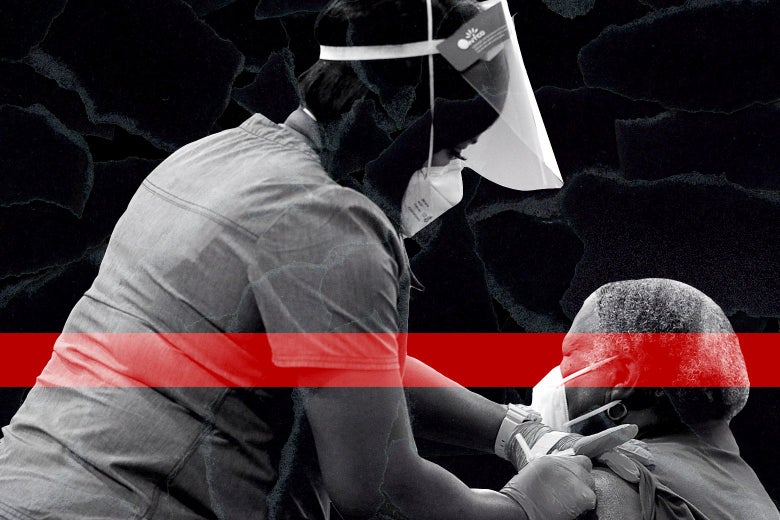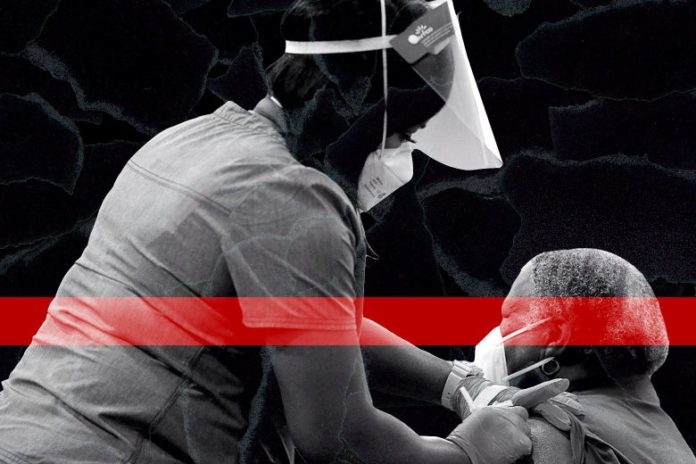
The COVID crisis ripped through the Black community, with Black people accounting for almost a quarter of the 600,000 deaths that America has had so far. And as the delta variant brings back crowded hospital wards and mask mandates, many health care leaders are struggling to minimize the pain for Black America. Dr. Reed Tuckson is one of those on the front lines of the fight. He’s a veteran physician, public health advocate, and co-founder of the Black Coalition Against COVID. On Friday’s episode of A Word, I spoke with Tuckson about increasing access to vaccines in Black communities and debunking misinformation surrounding the virus and vaccines. Our conversation has been edited and condensed for clarity.
Advertisement
Jason Johnson: What does the Black Coalition Against COVID do, and what inspired you to launch it?
Advertisement
Advertisement
Dr. Reed Tuckson: Well, thanks for asking. And I was fortunate enough to be the commissioner of public health for Washington, D.C., during the height of the AIDS epidemic in the 1980s. I learned firsthand how important it is to have community-based, grassroots mobilization to fight major public health challenges as a partner with government efforts. And so when we saw Easter Sunday about a year and three months ago or so, what the pandemic looked like it was going to mean to the Black community, I was able to reach out to the community influencers all across Washington, D.C., and grab together the faith community leaders and musicians, poets, artists, organized labor, the academic community, the medical community—just bringing together community-based organizations and engage those leaders in a mobilization to fight this pandemic.
Advertisement
As we evolved, we learned that we needed a lot more medical firepower. And we were very fortunate then to pull together and organize the CEOs and the leaders of the four Black medical schools—Howard, Meharry, Morehouse, and Charles Drew—along with the National Medical Association, the National Black Nurses Association, taking all of this firepower of America’s leading Black academic physicians and medical societies, and combine them with the National Urban League and the largest digital publisher for health information for the Black community, blackdoctor.org. And so we put all of that together, and now we have done probably 20 national town halls for the Black community … and probably have reached about 2 million people just in those town halls alone. So we’ve had a lot of success and we’ve enjoyed a great deal of support across the breadth and depth of the Black community, along with our leading Black health professionals.
Advertisement
Advertisement
After putting together these efforts and trying to get the information out there and trying to get people vaccinated, Black folks still lag behind white people when it comes to vaccination. Do you think that the Black community is behind in vaccinations because of lack of access to vaccinations or a desire to not be vaccinated? Which do you think it is, based on your work?
Early on, we knew that it was going to be difficult to gain acceptance for the vaccine because of the historical seeds of distrust that have been so deeply planted in the Black community. We were fortunate to see that, through the combined efforts of many different people and many different influencers, we were able to vaccinate an extraordinarily large number of people—particularly our seniors were very responsive to being vaccinated. The access issues early on for convenience in our communities and the ability, in the early stages, to register were also complicated by our relative disenfranchisement from internet sites and being facile with being able to play the registration online game. That no longer is an issue.
Advertisement
Now, what we’re left with is a harder-to-reach group of people who for a variety of reasons are acting upon not only distrust of America’s elites, America’s infrastructures—because of the politicization of the pandemic and the vaccine in particular by former President Trump, who has hurt us in ways that are just almost incalculable—we also are being targeted very deliberately by people pushing misinformation. And then finally, we are being very much victimized by an underlying anger. We’re just angry. And the social media anger is really causing us challenges at being able to try to get people to accept this sort of intelligent and science-based guidance.
Advertisement
When you talked about issues of access, you say access isn’t really an issue now. I can relate my personal experience of when I tried to get vaccinated. It was at a health care center in a mostly Black and Latino neighborhood. And there were no Black and Latino people in line, except for me and a friend of mine. I mean, it looked like Lollapalooza. It was nothing but white people who had obviously found out this was a place they could go. And so my question for you about that is I can imagine that to the community surrounding that health care center, when they see all these white folks, they’re like, “I don’t even know if I want to be a part of this.” So do you think that could’ve had an effect?
Advertisement
I think what it did was to fuel the sense, again, of anger, of distrust, of we are being somehow victimized by an oppressive society that has more elites having privilege. Clearly we were, across the country, hearing reports about how upset people were that the registration process seemed to disadvantage us, as evidenced by “How did all of these white people suddenly wind up in our community when they have never been here before? It’s a miracle.” The odd thing about it, though, is our reaction to it. Instead of our reaction being, “Why are these people willing to do something that they’ve never done before, to take this kind of risk, to get access to a scarce vaccine to save their lives?” we’re still standing back going, “I’m not so sure whether I want to do this.” So instead of it stoking our competitive fires in many cases, somehow it drove us away.
Advertisement
Advertisement
It’s not much different than our response to the Tuskegee syphilis study, which is, when you think of it, very counterintuitive. A study where Black men were denied access to a drug that would have saved them. Now, in our legitimate anger about the outrageousness of that study, across this country, many, many, many people of color are saying, “Well, because of Tuskegee, I’m going to now deny myself access to the very vaccine that could save my life.” These issues, as you well know, are so complicated. They’re so intertwined with subtleties and nuances that it is often amazing that people will act not in their own best self-interest simply because they are so angry.
Advertisement
You led public health efforts in D.C. during the AIDS epidemic in the ’80s. During the AIDS crisis, you had people saying, “Well, this is just for gay people” or “This is just for immoral people.” What was it like? What were some of the challenges that you faced then?
What’s really kind of very sad is that it is almost exactly like it is today. Here you have a disease that is spread in ways that people did not understand. Therefore, there was a lot of mistrust about what it means to me and others. … I recall so well on every radio show that I did, it was always Tuskegee, Tuskegee, Tuskegee. “This is a plot by the white man to kill Black people.” “It was made in a lab at the CIA.” It’s very frightening. And then of course it was us against them, me against you. “I’m not going to do what I need to do to protect my sexual partner because it’s all a plot.” And so often I’d be on a phone call like this with you, and a person would call in and say, “Well, this is a plot against Black people developed by the white man and the CIA.” And then I would ask, “Brother, what does that got to do with you wearing a condom tonight with your lady?” And all of a sudden, it was like, “Well, I don’t have to wear a condom because I can’t get it and she can’t get it because it’s not even a real disease.”
Advertisement
Advertisement
Advertisement
But this is the outrageous part, and I think it’s something we’re going to have to deal with. That was 40 years ago. If Tuskegee was the rate-limiting step to try to talk to Black folks about the importance of protecting not only themselves, but their partners and their community from that disease, we have done nothing in 40 years to take Tuskegee off the table. How could that be the rate-limiting step yet again? Shame on the American research enterprise, shame on the American clinical care enterprise, and shame on the American public policy enterprise, that together our health care industry—of which I am a member—have done nothing in 40 years to give Black people the sense that the guidance and advice is being given to them out of love, out of respect, out of concern for their health, as opposed to the distrust that we see rampant today.
Listen to the entire episode below, or subscribe to the show on Apple Podcasts, Overcast, Spotify, Stitcher, Google Play, or wherever you get your podcasts.








